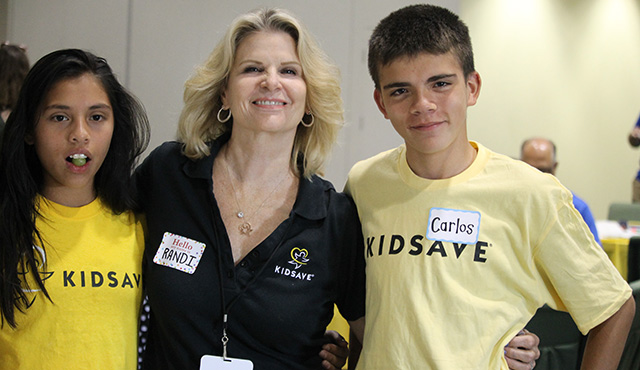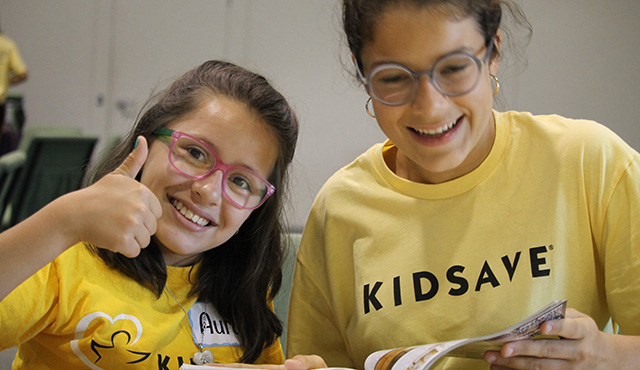Aura did not stop smiling. Carlos had an innocent and deep look. And next to him, his sister Mariana cut out figures from a magazine and colored them, while Karen cheerfully played with a new toy. The children chatted and laughed and played during a meeting at University Synagogue in Irvine earlier this summer.
The four Colombian children are orphans. They and seven other children, ages 8 to 13, arrived in Los Angeles as part of Kidsave’s Summer Miracles program. Launched in 1998 by Randi Thompson and Terry Baugh, the program has expanded to a number of countries, including Russia, Sierra Leone and Colombia.
Thompson, Kidsave’s co-founder and executive director, recalls the first time she visited an orphanage in Kazakhstan in 1998. She saw that the adolescents were emancipated from the orphanage with little education, no job options and no hope.
“There I saw the most terrible things; children with very little education who ended up on the streets,” she told OC Catholic. “But in their eyes, I saw the desire for someone to take an interest in them and adopt them. No one worked to get them out of the orphanage, to feed them or to educate them well. They [orphanage officials] focused on giving babies for adoption, but they forgot the older ones, so Terry and I decided that we had to do something.”
Thompson managed Kidsave’s first Summer Miracles Program from her desk at home; her work brought 177 orphans to the U.S. for a summer vacation, with 97% of them finding homes with families. She went on to pioneer the Family Visit Model in Russia and Colombia. Thompson currently oversees Kidsave’s finances and the organization’s Los Angeles and international operations. Her own family is a reflection of her work; she has two adopted children, two stepdaughters and one grandchild.
Initially, Thompson and Baugh reported on the problem in the U.S., but people thought they could not do anything substantial on the issue. They worked hard, however, and after a year of effort they found families interested in hosting that allowed them to bring some children to the United States for a visit.
“Those children that were looking for a family had no reason to hug anyone,” Thompson said. “But when we brought them [to the U.S.] in 1999, six weeks later those children blossomed as they were nourished by love, and we convinced families to bring them to the community, to know them and to consider adopting them.”
The Colombian children visiting this summer knew that they were here on vacation; that they would stay for five weeks in the home of a host family. The possibility of being adopted was open, but they didn’t know anything about it.
“Many of the families who receive the children are only advocates of the program, they do not necessarily want to adopt a child, but they also help us to find adoptive families that can be a great match for the kids,” Thompson said.
In 2015, the Colombian Family Welfare Institute (ICBF) reported that 10,442 children were declared adoptable, with 4,669 considered having a special status; they are over two years of age, they suffer from some form of illness or disability, or are a part of a family group. Of these, 3,224 were 13 years old or older.
Official data from the ICBF indicate that, while 1,035 children with special circumstances were adopted in 2011, the number dropped in 2014 to 652. In 2015, only 480 children were adopted and 75% of those adoptions went to foreign families. Currently, 2,201 non-Colombian families are waiting to adopt.
“I believe in God and I feel fortunate in life when I started doing what I thought I could not do,” Thompson said. “I remember that I could not forget those children’s faces in that orphanage in Kazakhstan. I couldn’t take them out of my mind … I was happy in my job [in marketing communications], but I knew I had to do something bigger as a purpose in my life.”
At the end of the meeting at the University Synagogue in Irvine, Thompson approached Aura, then Carlos, Mariana and Karen. She admired their artwork, collages of pictures the children cut and pasted to represent their dreams for their lives.
“They deserve a chance at life,” Thompson said. “To me, to get ahead with this project, it was only possible with the help and grace of God.”


